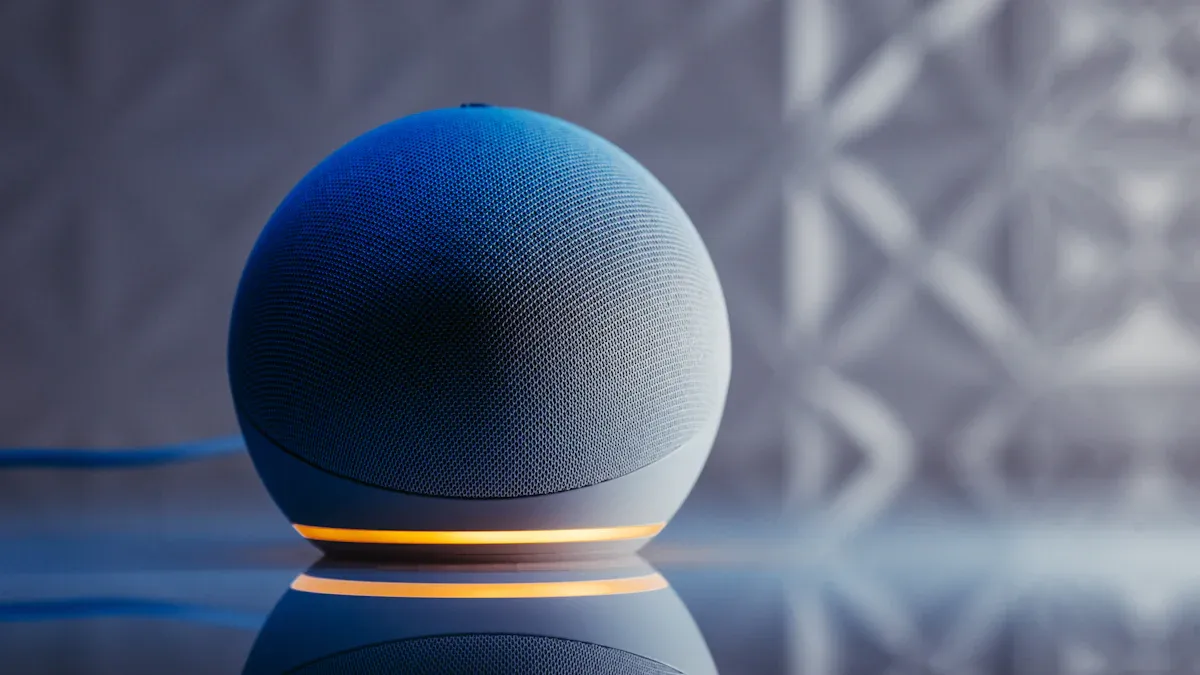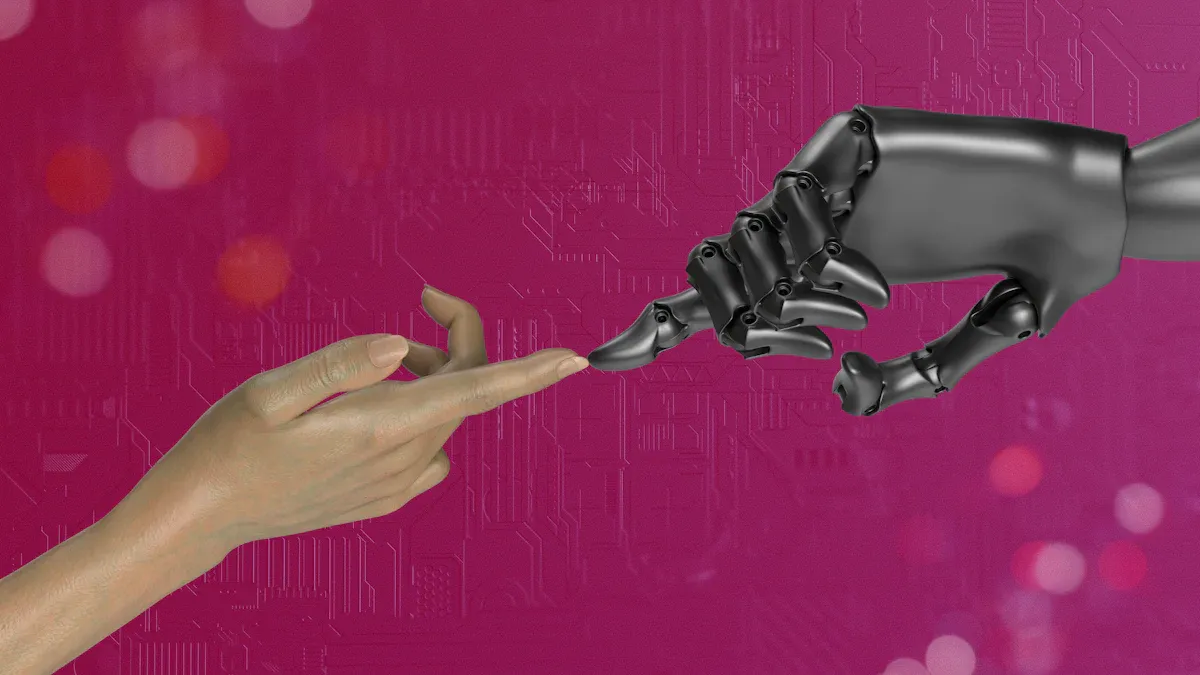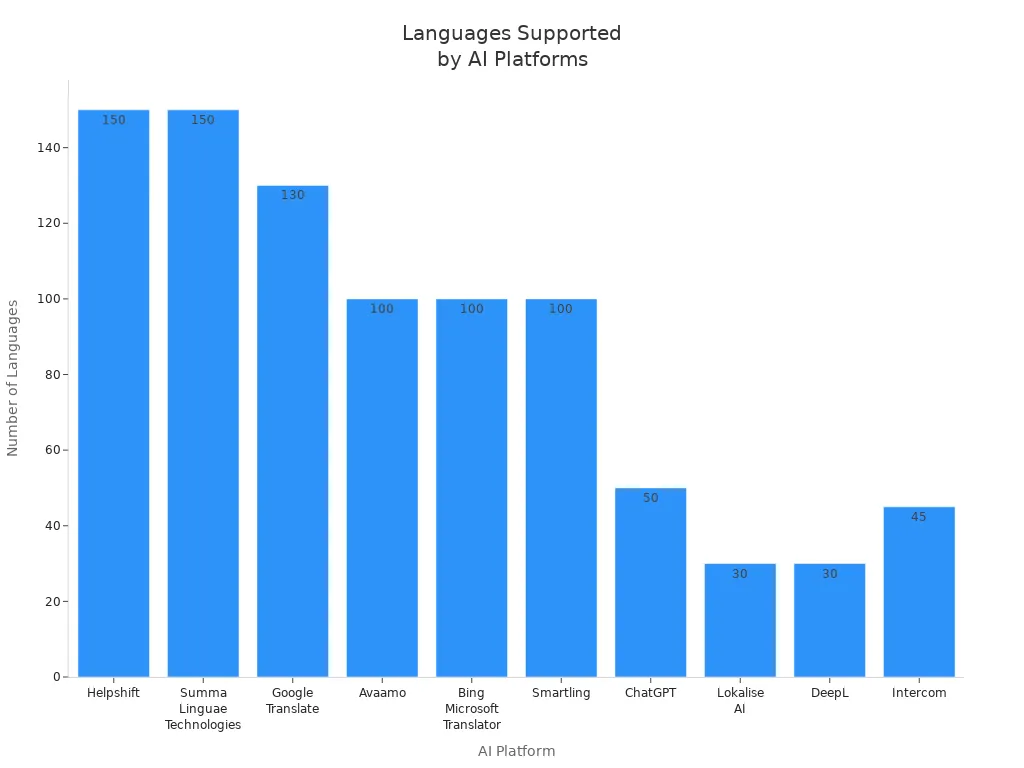The Best Voice Assistant Innovations Transforming Daily Life

Image Source: pexels
The best voice assistant innovations, like Codot, change how people handle daily life. Today, ai voice technology helps millions do tasks, set reminders, and get information easily. Many people use voice assistants for quick scheduling, talking to others, and shopping.
Ai voice technology helps people work better by doing tasks for them. It also helps people with disabilities use technology more easily. Personalization is growing as ai voice technology learns what each person needs. This makes every use more helpful and feels more natural.
Tech Advances

Image Source: unsplash
Natural Language Processing
Natural language processing is very important for ai voice technology. New improvements help ai voice agents understand what people say. They can figure out what users mean and answer in a way that sounds real. Models like Whisper and GPT-4o-transcribe help voice agents hear words better, even with noise. Neural networks let ai voice agents deal with slang and different ways people talk. Machine learning helps them get better by learning from users. These changes make talking to ai feel more like talking to a person. Codot uses natural language processing to make talking smooth and learning easy. This sets a new level for ai voice technology.
-
Speech recognition changes spoken words into text.
-
Natural language understanding figures out what users want.
-
Natural language generation makes good answers.
-
Machine learning helps ai voice agents get better all the time.
-
Handling slang and accents helps more people use it.
Emotional AI
Emotional AI helps ai voice technology show feelings. Sentiment analysis finds out if someone is happy or upset. Voice agents change how they talk to match the user's mood. Companies using this see happier customers. Now, ai can answer with care, making people want to use it more. Codot’s reminders use feelings to help users, making ai voice agents more useful. Emotional AI helps the voice recognition market grow by making talking to ai feel more real.
-
Tone analysis and emotion checks make things better for users.
-
Adaptive answers help ai voice agents sound caring.
-
Emotional AI makes people happier and more interested.
Multilingual Support
Multilingual support lets ai voice technology help more people. AI voice agents now talk and listen in many languages and accents. This means more people around the world can use ai. Codot and other platforms use deep learning and speech recognition to support many languages. The voice recognition market grows because more people can use it.

| AI Platform | Number of Languages Supported |
|---|---|
| Helpshift | Over 150 |
| Google Translate | Over 130 |
| Bing Microsoft Translator | Over 100 |
| ChatGPT | Over 50 |
| DeepL | Over 30 |
Edge Computing
Edge computing changes how ai voice technology works. Devices now process data right where you use them. This makes things faster and keeps your data private. Voice agents can answer right away, even without internet. Your private data stays on your device, not on outside servers. Wake-word detection uses little power, so it saves energy. Edge computing lets ai voice agents work in places with bad internet. Codot uses edge computing to give fast and safe answers. This helps the voice recognition market grow.
-
Local processing makes things faster.
-
Privacy is better because data stays on your device.
-
Edge computing lets you get answers right away and offline.
-
Personalization happens safely without sending data away.
Best Voice Assistant Features
Intelligent Prioritization
Intelligent prioritization helps people focus on important things. Codot uses smart AI to sort tasks by what matters most, deadlines, and what users like. This makes Codot different from other ai voice agents. Many voice assistants use natural language processing and machine learning to follow commands and learn what users do. Codot does more by looking at how people work and changing as their needs change. Users see their to-do lists sorted for them. This saves time and helps them make fewer choices.
-
Codot works like a personal helper for managing tasks.
-
It lets people manage tasks without using their hands.
Other virtual assistants help with tasks too, but Codot’s way is more personal. AI assistants do simple jobs, set up meetings, and send reminders. This makes hard task management easy to talk about. People feel less stress and get more done.
Smart Scheduling
Smart scheduling is an important part of new ai voice agents. Codot uses AI to fit meetings and tasks into a person’s day without causing problems. It changes to fit what people like and when they are free. This makes planning smooth and quick. Many voice assistants help with calendars and lists, but Codot’s scheduling changes as things happen.
AI assistants help people do more by planning things for them. They move meetings to stop problems and breaks. Codot works with popular calendar apps, so everything is in one place and updates right away. People say they feel less stress and like their schedules more. Studies show smart scheduling by ai assistants helps people do more and feel happier.
Smart scheduling saves time and stops double-booking. Codot’s caring AI sees when people are stressed and suggests breaks to help them feel better.
Adaptive Reminders
Adaptive reminders make voice assistants more useful. Codot learns how people react to reminders and changes them to fit each person. This makes reminders come at the right time and matter more. AI voice agents use things like where you are and what time it is to make reminders better.
-
Codot changes reminders for each person, even those with health needs.
-
It uses voice and easy controls for people with vision or hearing problems.
-
Health tools include medicine reminders and emergency alerts.
-
Codot updates reminders when people give feedback, so they stay helpful.
-
How often and how reminders are sent matches what each person likes.
Other virtual assistants give reminders, but Codot’s system is special. AI assistants make reminders fit each person, so they are easier to use. This helps people remember things and finish their tasks.
Notes and Knowledge Base
Codot has a strong notes and knowledge base feature. People can record ideas, upload pictures, and make a personal place for information. Codot remembers pictures for later, which is rare for ai voice agents. Smart tags help sort notes and tasks, so finding them is fast and easy.
| Feature | Codot | Other AI Voice Agents |
|---|---|---|
| Voice interaction | Yes | Yes |
| Picture upload | Yes | Rare |
| Smart tag classification | Yes | Sometimes |
| Adaptive learning | Yes | Yes |
| Knowledge base | Yes | Sometimes |
Virtual assistants help people keep track of information, but Codot’s system is better at organizing and finding things fast. AI assistants help people find and share information easily. Codot’s notes feature helps people get more done and feel less stress by keeping things in order.
-
Codot’s knowledge base helps people remember important things.
-
AI voice agents let people take notes and manage info without using their hands.
-
Smart sorting saves time and helps people work with others.
Voice-controlled virtual assistants like Codot change daily life. They give smart sorting, easy scheduling, helpful reminders, and organized notes. These features make Codot a top choice for getting things done and feeling less stress. AI assistants keep making life and work better for everyone.
Daily Life Uses

Image Source: unsplash
Home Automation
Voice assistants are now a big part of smart homes. Many families use them to control lights and other devices. You can say a command to turn on lights or change the temperature. Some people use voice assistants to start a robot vacuum. Codot uses special models on IoT edge devices. This means it hears your commands right away and works on the spot. Your private info stays safe because it does not leave your home. You also get answers faster.
-
People use voice assistants to:
-
Control smart home gadgets
-
Hear news and weather
-
Play music and shows
-
Help with chores like cleaning
These tools make it easier to run a home. Voice assistants help families with daily routines. More people want smart tech because it is easy to use. Many users like how simple it is. They feel more in charge of their homes.
Work Productivity
Voice assistants help people get more done at work. Workers use them to set up meetings and send reminders. Codot helps people find info fast and manage tasks. In remote jobs, voice assistants set up online meetings. They help teams work together in different time zones. Voice assistants also link with Google Drive and Dropbox. This makes teamwork easier.
-
Voice assistants help by:
-
Letting people work hands-free and save time
-
Keeping track of hours and remote workers
-
Giving quick info without searching
-
Virtual assistants give reminders that fit each person. They suggest ways to work better. Many jobs use voice assistants for things like dictation and tracking money. Customer service ai virtual assistants answer easy questions. This lets workers do more important jobs. Companies see better work and happier customers.
Voice assistants save time on simple jobs. They help stop mistakes and make work smoother for everyone.
Healthcare Support
Voice assistants help in hospitals and clinics. They watch patient health and remind people to take medicine. Codot can tell patients when to take pills or see a doctor. It can also warn doctors if something is wrong. Many older people use virtual assistants for daily help. They can talk to doctors online or get help in an emergency.
-
Voice assistants in healthcare:
-
Give help all day with AI-powered nurses
-
Let patients control their rooms with their voice
-
Help with remote care and personal coaching
Most patients like using voice assistants for health tasks. Hospitals get fewer calls because ai virtual assistants answer simple questions. This makes patients happier and helps them faster. Voice assistants also help with mental health by giving support and exercises. They help people who have trouble with language or movement. This makes healthcare easier for everyone.
Accessibility
Voice assistants help people with disabilities do more on their own. People who have trouble moving or speaking can use voice assistants. They can control lights and devices with their voice. This means they do not need as much help from others. Codot has features like timing and clear feedback. This helps people with different needs use it easily.
-
Benefits for people with disabilities:
-
Do basic things like turn lights on by themselves
-
Use tech that feels normal, not like special devices
-
Enjoy features that change to fit their needs
-
Studies show people with some skills can use voice assistants well. Many users say they like these devices at home. Voice assistants help people with disabilities feel more free. They also make life better and more independent. More people can use technology because of virtual assistants. This helps everyone get better service and support.
Voice assistants help people with disabilities live on their own. They also make tech easier for everyone to use and improve customer service.
AI Voice Technology Trends
Proactive Assistance
Proactive assistance is changing how people use ai voice technology. Now, voice assistants can guess what you need before you ask. They use device continuity and situational awareness to give updates for your location or change modes in meetings. Machine learning and natural language processing help make detailed user profiles. These profiles let ai assistants send news, reminders, and tips based on your habits. People want voice assistants to work on all their devices and in different places. The ai voice market is growing quickly, with over 8 billion voice assistants used worldwide. By 2028, experts think there will be 170.3 million users in the US. This shows ai voice technology is becoming a daily tool for homes, cars, and businesses.
-
Voice assistants look at how you use them to guess your needs.
-
Personalized experiences help customers feel happy and stay interested.
-
Privacy features like choosing to share data help build trust.
Emotion Recognition
Emotion recognition is a big trend in ai voice technology. Advanced machine learning and convolutional neural networks help voice assistants find emotions in speech. They check pitch, tone, and context to see if someone is happy, sad, or sarcastic. Sentiment analysis lets conversational ai answer with care. For example, a bank saw customer service get 30% faster after using emotion detection. Top voice recognition companies use these tools to make conversations feel real. Emotion recognition also helps with mental health and customer service. In the future, ai voice technology will use voice and face cues to understand feelings better.
Emotion-aware ai voice assistants make talking feel more human and special.
IoT Integration
IoT integration links ai voice technology with smart devices. Voice assistants control lights, thermostats, and security systems with simple commands. This hands-free use saves time and helps people who have trouble moving. The voice recognition market grows with multi-device use. People can control many devices with one voice assistant. Setting up means connecting devices and making commands personal. Voice technology lets people automate things like lights and temperature. Data analytics help systems learn what users like. The ai voice market is growing as more homes and businesses use smart devices.
-
Voice assistants help automate tasks and make things work better.
-
IoT integration makes experiences personal and easy to grow.
-
Smart homes use conversational ai for easy control.
Personalized Routines
Personalized routines are changing ai voice technology. Voice assistants use data analytics and machine learning to make routines for each person. They remember what you like, plan tasks, and change reminders when you give feedback. Better personalization helps people stay interested and get more done. The voice recognition market is seeing more ai voice technology that fits each person. Voice search trends show people want assistants that match their lives. The voice search world is changing as ai voice and voice search work together for smarter routines. People want companies to make conversational ai and voice technology better.
| Trend | Impact on Users | Example Use Case |
|---|---|---|
| Predictive Analytics | Anticipates needs | Automatic reminders |
| Voice Biometrics | Secures transactions | Voice-based authentication |
| Generative AI | Dynamic responses | Context-aware answers |
Privacy and Ethics
Data Protection
Voice assistants collect things like voice recordings and location. Many people worry about privacy because devices might record by mistake. Sometimes companies share data with other groups or use it for ads. There are risks like hacking and fake voices that can control devices. Some stories show workers listening to recordings or companies getting in trouble for privacy issues. Laws like GDPR and CCPA protect users and ask for permission before using data. Good data protection keeps information safe.
-
Use strong passwords to stop others from getting in.
-
Keep data in locked databases with strict rules.
-
Follow privacy laws to help users trust the company.
User Control
Users should control their own information with voice assistants. They need to know what is collected and how it is used. Privacy dashboards and clear rules help people see their choices. People can mute devices to stop unwanted listening. Setting up voice recognition and wake words carefully helps stop mistakes. Changing privacy settings lets users check, delete, or limit sharing of voice data.
Tip: Make accounts with passwords for each person to keep data safe.
Users can delete certain voice recordings or all of them. Some voice assistants let people change ad topics or say no to personal ads. Being open and asking for permission is important for user control.
Safe Adoption
Safe use of voice assistants means following good rules at home and work. Devices that keep data local help protect privacy. Companies should be fair, honest, and careful. Testing and checking often helps find problems and bias. Clear labels on AI help people know what is happening.
-
Make conversations that respect privacy and ask for permission.
-
Follow laws and get permission before recording.
-
Be honest about what AI can and cannot do.
-
Keep user data safe with strong security and privacy steps.
Using voice assistants the right way protects everyone. Good business plans and strict controls stop bad use. Users should learn and use privacy settings to keep their info safe.
Voice assistants like Codot help people with daily tasks. AI learns what each person likes and changes to fit them. Some big changes are natural language processing and smart scheduling. You can use voice assistants without using your hands.
-
Personalization lets families, workers, and people with disabilities use them.
-
Multilingual support helps more people talk to voice assistants.
-
More people use ai voice tools at home and work, so the market grows.
| User Group | Benefits |
|---|---|
| Families | Do chores, control gadgets, keep kids busy |
| Professionals | Get more done, make jobs easier |
| People with Disabilities | Use tech with voice, feel included |
To get ready for the future, check your privacy settings. Try out new features and pick platforms you trust. Using voice assistants makes life easier and helps people do more every day.
FAQ
What makes Codot different from other voice assistants?
Codot uses smart AI to learn what each person does. It puts tasks in order by what matters most. Codot changes reminders to fit each user. It has a strong notes feature. Codot works offline to keep things private.
Can Codot help people with disabilities?
Yes. Codot lets people use voice commands and gives clear feedback. People who cannot move or see well can do tasks with their voice. They can set reminders and control devices easily.
How does Codot protect user privacy?
Codot keeps data on your device. It does not send private info to other places. Users choose what data stays or gets deleted.
Does Codot support multiple languages?
Codot can understand and speak many languages. Users can change the language in settings. This helps families and teams who use different languages.